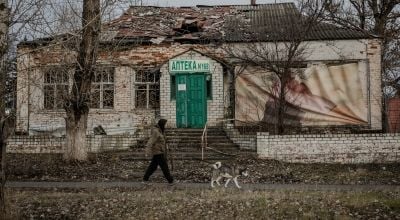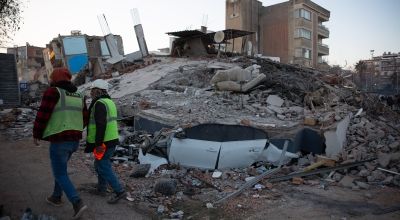
Read our 2024 annual report

Knowledge Hub
It has been two years since the beginning of the conflict in Ukraine. Concern continues to support communities within Ukraine alongside the partners we work with, thanks to your kind donations.
One of the ways we are meeting the needs of communities is to provide a stable education for children, in addition to psychosocial support, as many children experience anxiety and symptoms of post-traumatic stress disorder (PTSD) induced by the trauma of conflict.
The children of Ukraine are among the invisible victims of the current conflict – with many schools closed and over one third of classes still delivered only online since last year. There are plans in some parts to open underground classrooms and play restricted to back gardens.
“The mums, the dads and the local authorities are all adamant that their children are their future,” Concern’s Head of Emergency Operations Ros O’Sullivan explained. “The parents themselves are very traumatised but they are putting every ounce of energy into their children.”
The reality for any child aged under six is that the conflict has denied them the opportunity to lead a normal child’s life, with social inclusion/cohesion and forging relationships through play and interacting with other children.
Concern is working with them, providing weekly psycho-social support (PPS) sessions for children aged between four and 15 and adults, and has reached almost 6,000 people in 2023 with the sessions.

“Children have not gone back to school since before COVID,” Ros explained. “School buildings are empty and many children are being educated online. In February they will be two years out of school as a result of the conflict. Having spent the day online, some children now come to the local school building for a two-hour PSS session each week.”
Even those sessions are regularly interrupted by air raid warnings. In rural parts of Kharkiv and Sumy Oblasts in eastern Ukraine, some schools do not have their own shelters, so the children must go hand-in-hand to a nearby shelter, singing the national anthem as they go.

The parents cannot talk about their trauma without breaking down. The greatest fear of parents in areas which were previously occupied by Russian forces is that their children could be captured, Ros noted. They are brought to the PSS sessions and the mothers/carers wait outside to collect them.
"During the occupation, parents practically did not let their children go outside. The maximum was a short walk in their own backyard under the supervision of elders. But the children didn't even need the explanations. They realised that something was wrong and sat quietly, like mice," said Natalia*, a 26-year psychologist who travels 60km to provide the PSS sessions.
The children look forward to spending time with Natalia. Everyone especially liked the latest homework assignment: "I asked them to hug their parents after returning home and tell them how much they love them." Now the children do it without being reminded.

The group has an average of 20 children aged four to 15. Natalia finds an approach for each of them and comes up with a programme. The girls like to make handmade things like bouquets and origami, and the boys play table tennis almost continuously.
"These children will never forget what they have gone through,” said Serhii*, a psychologist working on a PSS programme in a nearby town. She aims to provide the children with positive coping mechanisms to deal with stressful and traumatic experiences in the frontline districts.
The children lack socialisation and active communication skills. Even proceeding to the shelter is perceived by them as an interesting adventure. Psychologists help kids to experience anxious moments as a fun game.
Sirens sound here several times a day. They can mean either active shelling or the takeoff of a warplane or helicopter near the Ukrainian border. As soon as the alarm sounds, kids, accompanied by adults, move to the nearest shelter as fast as they can.
With parents insistent that it is not safe for their children return to school while the conflict continues, in Kharkiv they are developing underground schools in the city’s Metro rail stations.
These children will have gone from COVID straight into bunkers and now they will not leave those bunkers. Nobody we spoke to has any real optimism that this conflict is going to finish any time soon. They are planning to educate their children underground. People are talking about the sheer cold they will face in the coming months and about how they will keep warm and nourished.
The region experiences bitter winter conditions with temperatures falling to minus 20 degrees Centigrade. As the winter approaches, people talk of the need to get stoves and firewood.
Concern is working with German NGO Welthungerhilfe as part of the European Alliance2015 to support communities. The PSS programme is provided through local community organisation, We are Brothers.
In addition to the PSS programme for children and adults, Concern and our partners are helping up to 100,000 people through cash assistance, winter payments to help cover utility payments and other winter needs, in-kind items such as hygiene kits, cookers and firewood, and livelihood supports.
*Names have been changed for safety reasons.






